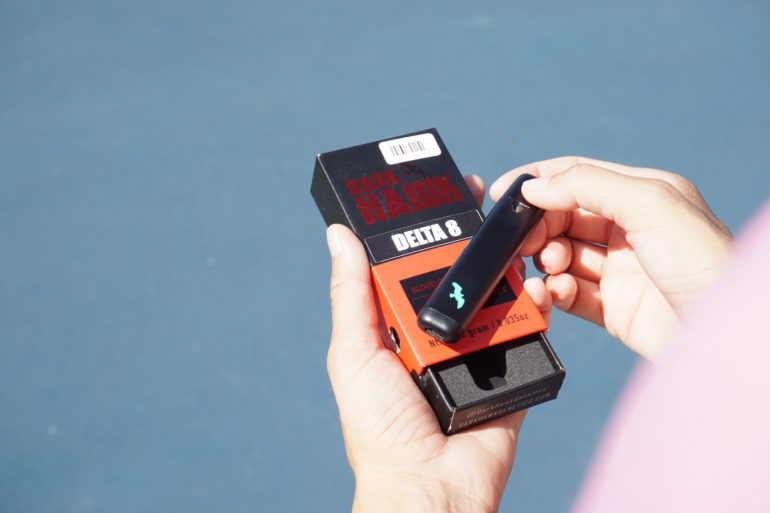Delta-10 and delta-8 THC may sound similar, but they’re both unique cannabinoids that create different supportive experiences for consumers. However, not many people know the distinct components that make delta-8 and delta-10 so different.
So, exactly what are these key differences? Let’s talk about them.
How to Distinguish Delta-8 From Delta-10: The Key Differences
Delta-10 and delta-8 are two cannabinoids that are found naturally in trace amounts within the cannabis plant genus. However, they are not the same cannabinoid in the slightest.
These two compounds vary in terms of effects, chemical composition, legality, and more. While they are alike in many ways (which we’ll also outline), it’s important for consumers to understand the key differences that these cannabinoids bring to the table.
Let’s start by talking about the difference in effects that delta-10 vs. delta-8 brings.
Bliss, Relaxation, and Well-Balanced Highs: The Effects of Delta-10 vs. Delta-8
Both delta-8 and delta-10 are known for providing gentle highs and supportive, therapeutic-like results. However, these kinds of psychoactive highs will vary in terms of how they make you feel, primarily due to potency.
Technically, the effects of delta-8 THC are going to be slightly stronger than delta-10 THC. This makes delta-10 a better option for beginners who aren’t well-versed in the world of cannabinoids yet; while delta-8 is good for those who want stronger effects but not as strong as the ones that delta-9 THC produces.
RELATED: What Does a Delta-8 High Feel Like?
Because delta-8 is slightly stronger than delta-10, many people report delta-8 providing a more euphoric, buzzy high, while delta-10 THC is more subtle and relaxing. Both compounds are great for those with high stress levels looking to unwind, but delta-8 will produce a stronger full-body result than the same dose of delta-10.
The differences are not all yet confirmed by research, but some evidence is starting to emerge. A 2023 survey published in Cannabis and Cannabinoid Research shows that participants considered delta-8 to provide the relaxation and pain relief associated with delta-9, but with less euphoria, difficulty with short-term memory, difficulty concentrating, altered sense of time, anxiety, and paranoia.
They also reported considerable substitution for pharmaceutical prescriptions such as sedatives, opioids, sleep aids, other synthetic cannabinoids, muscle relaxers, and non-opioid pain relievers. Patients also said that they lessened or even discontinued using alcohol, tobacco, e-cigarettes, nicotine vapes, CBD, and delta-9-THC.
Do Delta-8 and Delta-10 Have Different Side Effects?
In general, the side effects of delta-8 and delta-10 THC are fairly similar. Both cannabinoids activate the same CB1 receptor that THC does, and so may leave you with the following side effects:
- Dry mouth and dry eyes
- Increased hunger
- Dizziness
- Nausea
- Fatigue
- Headaches
- Lightheadedness
- Anxiety and paranoia
In terms of differences in side effects, there are a few between the two cannabinoids.
Delta-8 THC, for example, may leave you feeling extremely tired and sedative. Conversely, delta-10 THC may create feelings of paranoia because of the more stimulating effects.
However, the list of short and long-term health effects of delta-8, delta-10, and products advertising to contain them, are not yet fully known.
Delta-8 and Delta-10 Safety: Making an Informed Decision
Unfortunately, neither delta-10 nor delta-8 THC is currently regulated in the US, despite being legal at the federal level. This can cause a lot of concern for safety, as labs have only recently begun to craft these types of new cannabinoids.
Because of this, it’s up to you, the consumer, to purchase D10 or D8 products from brands that utilize proper third-party testing and full-panel COAs to demonstrate their product quality and safety.
RELATED: The Best Delta-10 Gummies for Euphoric Effects
When you purchase from hemp brands that don’t go to these measures, you simply cannot trust the D10 or D8 products that they’re selling. It’s integral to take the time to research the brand you’re looking at to see what their quality-control measures are, if they follow them, and what others have to say about the brand’s overall safety.
RELATED: The Best Delta-8 Brands to Try
You may read online that delta-10 THC is technically regarded as “safer” than delta-8 THC, but this is quite subjective. Neither cannabinoid is subjected to the level of quality control that it should be. However, since the delta-10 cannabinoid isn’t quite as potent as delta-8, many people consider it “safer” in that regard. Take that as you will.
Extraction Process and Chemical Composition of Delta-8 vs. Delta-10
Short and simple, delta-8 and delta-10 undergo the same extraction process — or lack thereof, we should say.
Again, D10 and D8 are both naturally present in the cannabis plant in small amounts. When we say “small,” we mean small — like in less than 1% of the whole cannabinoid profile of the plant. Because of this, professionals can’t really extract the cannabinoid from the plant at all.
Instead, the fastest method is to first take plentiful, hemp-based CBD and turn it into delta-9 THC by a Lewis-acid-catalyzed process. Then, extractors use a method called isomerization to convert newly semi-synthetic delta-9 into delta-10 or delta-8. Both general pathways for the cannabinoids are the same. We can’t say the same about the actual chemicals used in these reactions, though.
The chemical composition of delta-8 THC and delta-10 THC definitely are different. Different acidic chemicals are added to CBD and delta-9 to create one of these two (D8 or D9) at a time.
While delta-8 and delta-10 have a similar molecular structure, these two cannabinoids have a double bond that occurs on different carbon atoms on the molecule itself. The double-bond formation on delta-8 occurs on the 8th atom, while with delta-10, it occurs on the 10th atom.
Though minor, this difference in the double-bond location directly affects how well the cannabinoid binds to and works with the cannabinoid receptors in the body. The placement of the double bond may explain why delta-8’s potency is a bit higher than delta-10, as the cannabinoid may have a better affinity to the body’s cannabinoid receptors.
However, the way these two cannabinoids work in the body is something that researchers are still exploring.
Delta-8 and Delta-10 are Legal — For Now
Both delta-8 and delta-10 are legal under the 2018 Farm Bill as long as the cannabinoids come from hemp-derived CBD and do not contain more than 0.3% delta-9 THC by dry weight. But, even though they are technically federally legal, many states have started regulating these cannabinoids, effectively banning them in various places.
RELATED: Where Is Delta-8 Legal?
Have a Drug Test Coming Up? Avoid Delta-8 and Delta-10
Drug testing for delta-10 vs. delta-8 is going to be the same — there is no difference. Both cannabinoids, unfortunately, will cause you to fail a drug test if you take one. But, that’s not because these tests are looking explicitly for delta-10 or delta-8.
RELATED: How Long Does THC Stay in Your System?
When you take a drug test for cannabis, the test is looking for THC metabolites in the system. The drug test cannot differentiate between delta-8 or delta-10 metabolites; thus, you will fail the test if you’ve consumed any type of THC variant recently.
Finding Your Ideal Delta-8 or Delta-10 Dosage
As we’ve mentioned, delta-8 and delta-10 THC don’t have the same potency. Delta-8 is said to be about two-thirds as potent as delta-9, while delta-10 is slightly weaker than delta-8. Keeping this in mind, you will want to start with a slightly lower dose of delta-8 than you would delta-10, simply because it tends to be a bit stronger.
However, dosages vary between consumers, and there is no perfect “one-size-fits-all” dose. Instead, you have to do a bit of trial and error to determine what works best for your mind and body.
The best thing to remember here is to start low and go slow. This means that you want to start low with a dose, typically around 5 mg or so, to see how this low dose affects you over 2-4 hours.
Other, more experienced, consumers may be able to start with slightly higher doses, considering both delta-8 and delta-10 are milder in psychoactivity than your typical cannabinoid.
If 5-10 mg isn’t strong enough, then you can consume a slightly higher dose the next time, going slow when it comes to increasing the milligrams and waiting 2-4 hours before taking more. If you take them as an edible you should probably wait on the longer side as digestion takes longer and can be stronger.
This process can help you best determine how much delta-10 or delta-8 is right for you without overwhelming your body and creating an uncomfortable experience.
Shopping for Delta-8 vs. Delta-10: What to Look Out For
Whether you’re shopping for a delta-8 cartridge or some delta-10 gummies, it’s always important to shop from only the most reputable brands out there.
Make sure to check the customer reviews and see if anyone has had problems with potency, quality, or even customer service.
From there, it’s also integral to check the brand’s third-party lab test results. These should be readily available on the website, and the COAs should test for both purity and potency. You can check this by seeing if they just list cannabinoid percentages or if they also include tests for impurities like heavy metals, pesticides, residual solvents, and more.
If they don’t test for both, it’s best to shop from a brand that does.
Since these products aren’t regulated and are semi-synthetic, there is a chance that there may be unknown byproducts that are not checked for in typical COA testing. Because they are made by a series of harsh chemical reactions, there could be compounds in there that we simply don’t know about nor have knowledge of their health effects, either.
What’s the Difference Between Delta-10 and Delta-8? A Lot
At the end of the day, delta-10 and delta-8 are two totally different cannabinoids, and it’s important to treat them as such. From their effects to their potency and even their chemical composition, delta-8 and delta-10 THC are able to create two completely unique experiences in the world of cannabis. But, the only way to see these differences in person is to try the cannabinoids yourself and see how they compare.
View All References (3)
- (n.d.). Farm Bill. US Department of Agriculture. Retrieved February 9, 2023, from https://www.usda.gov/farmbill.
- Kruger, J.S., Kruger, D.J. Delta-8-THC: Delta-9-THC’s nicer younger sibling?. J Cannabis Res 4, 4 (2022). https://doi.org/10.1186/s42238-021-00115-8.
- NIDA. 2019, December 24. Cannabis (Marijuana) DrugFacts. Retrieved from https://nida.nih.gov/publications/drugfacts/cannabis-marijuana on 2023, February 9
Vanzan, L., & Murr, R. (n.d.). Isomerization. ScienceDirect. Retrieved February 9, 2023, from https://www.sciencedirect.com/topics/immunology-and-microbiology/isomerization.

